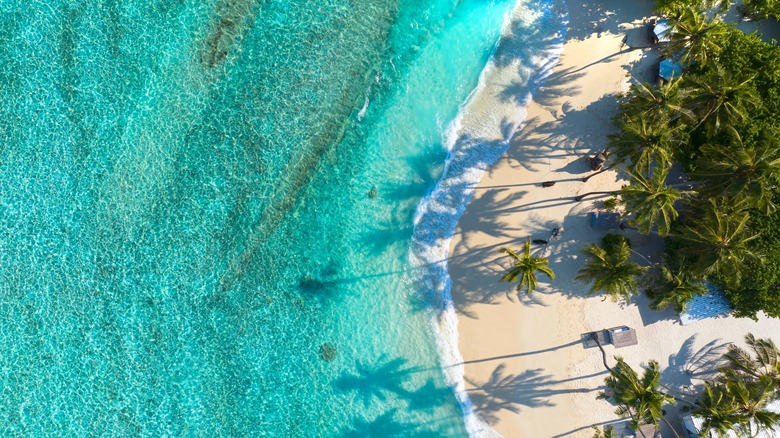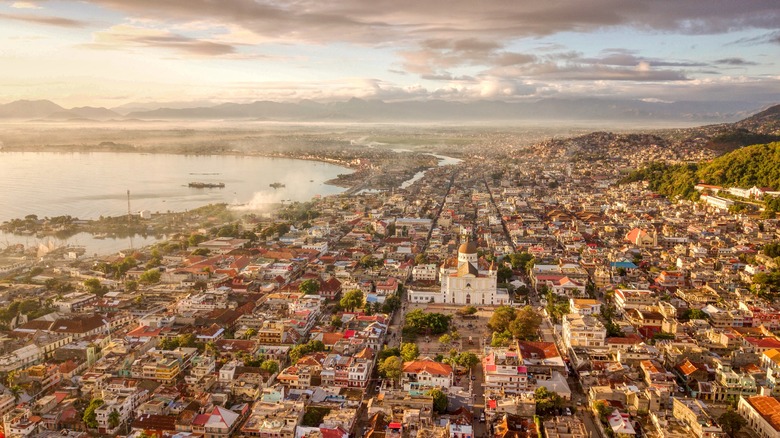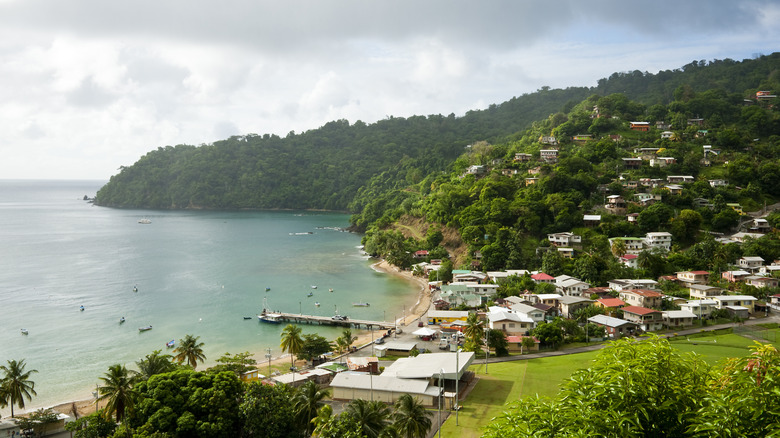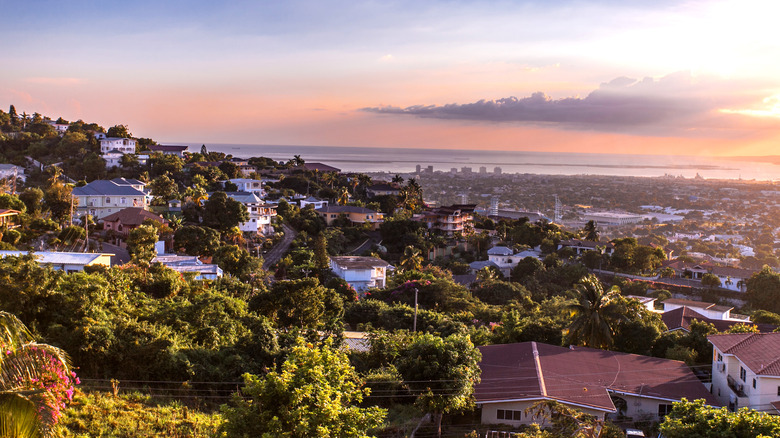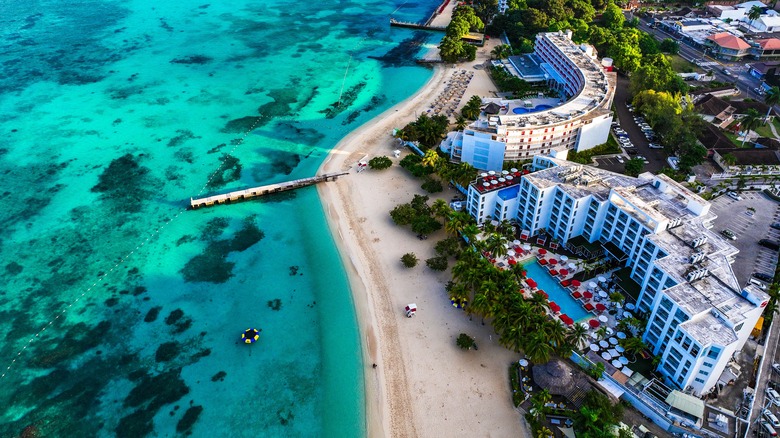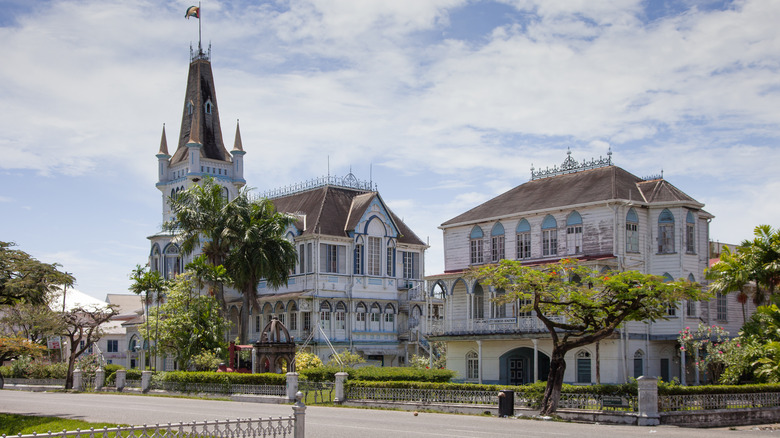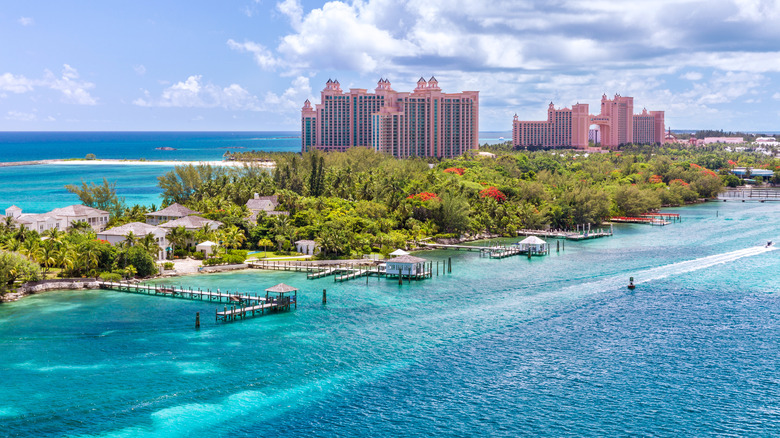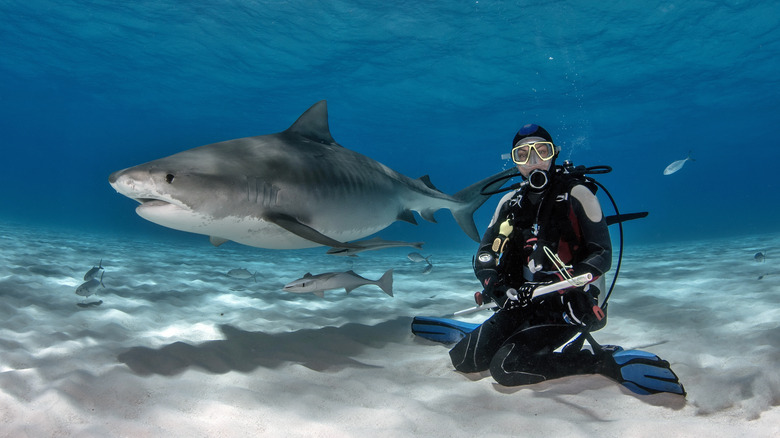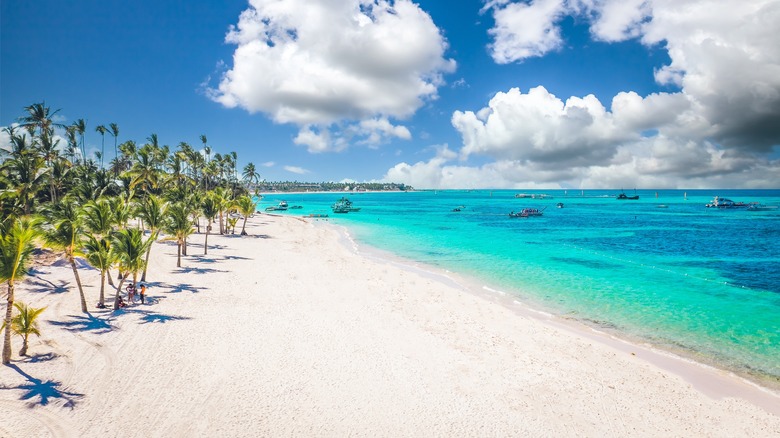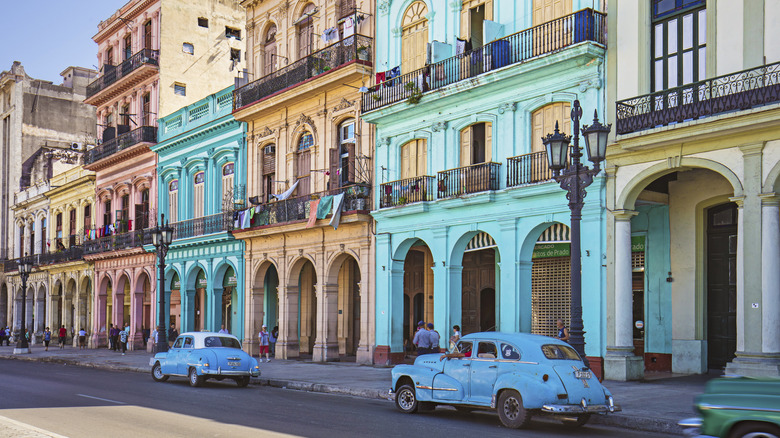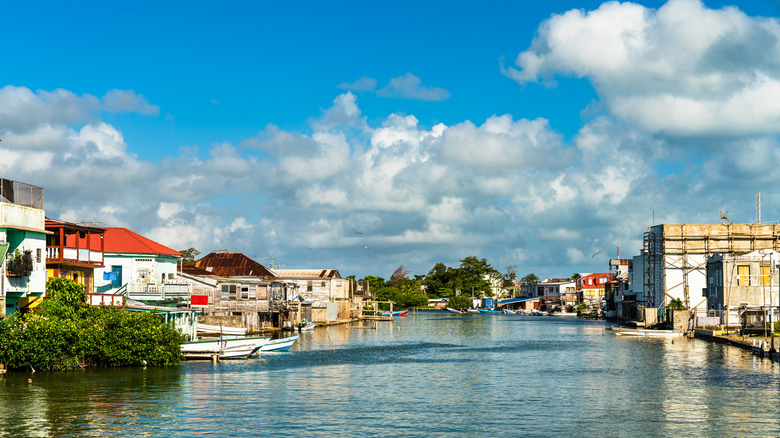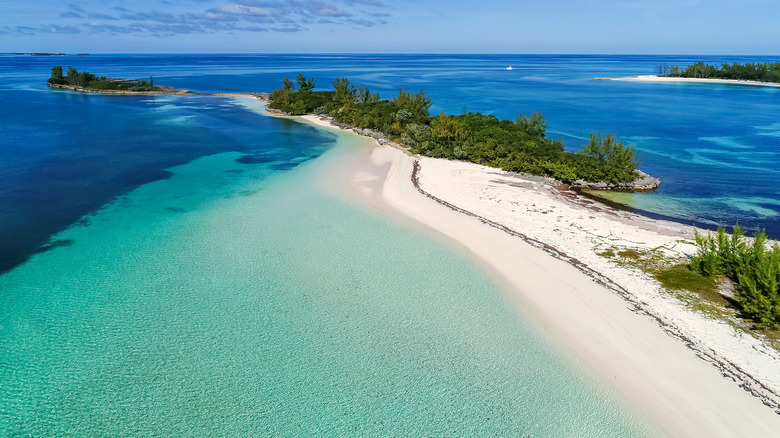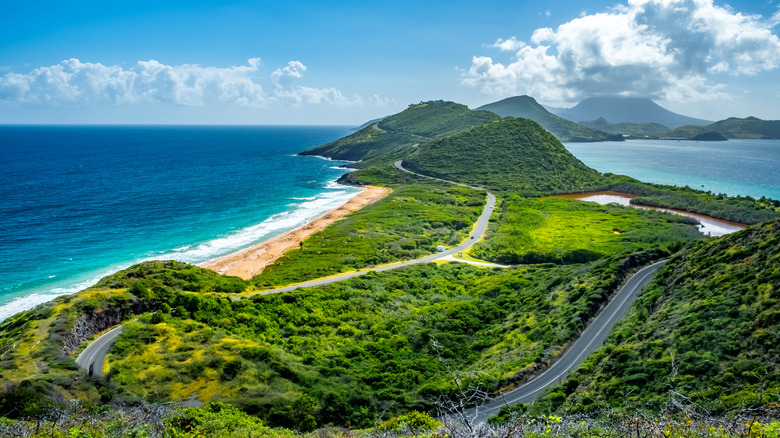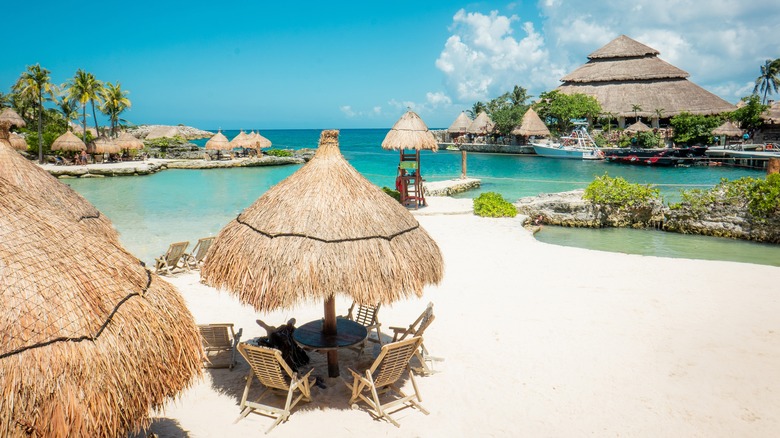The Most Dangerous Caribbean Destinations, According To Research
When planning a trip to the Caribbean, travelers should feel joyous at the thought of digging their toes into sugar white sand, splashing about in crystal clear seas, and exploring tourist sites without care. While plenty of Caribbean tourist destinations are worth having on your radar, a handful are best avoided. Whether they are riddled with crime, prone to shark attacks, or lack quality health care, you should be cautious when visiting the most dangerous Caribbean locations. Also, choose your timing wisely. Natural factors such as weather can cause hazardous conditions, so don't visit a place in the hurricane belt (i.e., the Bahamas' Abacos Islands) during hurricane season, which spans June through late November.
Despite their weak points, most places on this list have many redeeming qualities, so if you visit them, simply stay vigilant. No matter where you're heading, don't vacation to the Caribbean before you know all the crucial details, like which places to stay away from at night (i.e., Nassau's Fish Fry). Avoid sketchy areas, leave fancy jewelry at home, don't accept food or drinks from strangers, and stay in a group when traveling outside the resort. Wondering how we chose the places on this list? We delved deep into official research, examining warnings from the U.S. Department of State and other government agencies. We also consulted the Global Peace Index, looked at official crime statistics, examined detailed weather reports, and studied research on shark attacks.
Haiti
Haiti shares its lush island with the Dominican Republic, its beautiful beaches caressing both the Atlantic Ocean and the Caribbean Sea. Sadly, this country has been plagued by poverty (it's the Western hemisphere's poorest country), natural disasters, and political unrest. Today, Haiti is considered a no-go zone due to a massive spate of gang violence. In early March 2024, the country's government declared a state of emergency after gangs freed over 4,000 prisoners from two major prisons and attacked the international airport (via the Associated Press). The U.S. Department of State has instated a level 4 travel advisory, the highest of all, recommending tourists "do not travel" to this crime-filled country.
Haiti is ranked number 129 on the 2023 Global Peace Index (pdf), which is determined by the Institute for Economics & Peace (IEP) and judged on three elements: "societal safety and security, "ongoing domestic and international conflict," and "degree of militarization." At #163, Afghanistan has the worst GPI, which gives you an idea of Haiti's hazardous proclivities. According to the Department of State, kidnapping is a significant problem there, and many of the victims are Americans. Other serious issues include civil unrest, violent crime, such as carjackings and armed robbery, and poor health care. Multiple hospitals have closed because of violence.
Trinidad and Tobago
There's a lot to like about Trinidad and Tobago, including its tropical climate, coral reefs, and pretty beaches. This multi-island nation (made up of Trinidad, Tobago, and myriad tiny isles) is unarguably beautiful and filled with tasty food inspired by numerous cultures. If visiting in late winter, plan your trip around the popular Carnival festivities, which happen either in February or March. While there, you'll want to be cautious of where and when you leave the hotel – traveling at night is particularly dangerous, especially in unfrequented spots. The U.S. Department of State has issued a Level 3 advisory, the second highest, advising tourists to "reconsider travel" due to violent crimes like kidnapping and terrorism.
It suggests travelers steer clear of beaches, Fort George, Queen's Park Savannah, and the downtown area of Port of Spain at night. It also mentions the following areas as targets for terrorists: hotels, tourist-friendly restaurants, shopping malls, parks, markets, large events, clubs, places of worship, and public transportation. The island of Trinidad has suffered a boost in the number of ransom-based kidnappings and advises those arriving via cruise ship to be wary when wandering through Port of Spain. Trinidad and Tobago are tied for 70th place on the Global Peace Index, along with Kosovo and Liberia.
Kingston, Jamaica
Perhaps best known as the "birthplace of reggae music" and former home of master musician Bob Marley, Kingston is a natural wonderland fronted by beaches and backed by the majestic Blue Mountains. Tourists can enjoy this capital city's many restaurants, hotels, and attractions like the Bob Marley Museum, Devon House, and Emancipation Park. Unfortunately, certain areas of Kingston, like its downtown core, should be avoided due to high crime rates. According to the Jamaica Constabulary Force, there were 26 murders in Kingston between January 1 and March 9, 2024.
Jamaica has been issued a Level 3 travel advisory by the U.S. Department of State, which suggests that tourists "reconsider travel" to this region. According to the U.S. Embassy in Jamaica, crime is the main reason for this high level, and not just minor theft, although that's common in tourist areas. Serious criminal acts like armed robberies, murders, and sexual assaults have been happening frequently. Unfortunately, some of these horrendous acts have occurred at Jamaica's all-inclusive resorts.
The State Department has issued a "do not travel" warning for Kingston for U.S. government workers. The recommendation extends to downtown areas, including Trench Town, Tivoli Gardens, and Olympic Gardens. August Town, Cassava Piece, and Denham Town should also be avoided. If you plan to visit Kingston regardless of the advisories, the U.S. Embassy in Jamaica suggests pre-purchasing insurance, including medical evacuation.
Montego Bay, Jamaica
Montego Bay is a dreamy place to spend a sunny day by the shore, especially at Doctor's Cave Beach, which is one of the 10 best beaches in Jamaica. Located on the island's northwest coast, Montego Bay is filled with resorts, restaurants, tour companies, and enough activities to keep travelers of all ages happily entertained. As with many Jamaican cities, this coastal gem has a dark side that you should be wary about visiting. Deemed a "do not travel" zone for U.S. government employees due to concerns about violent crime and limited health and emergency care facilities, this city also falls under Jamaica's Level 3 travel advisory. According to the State Department's directives, the area known as St. James Parish should be avoided, especially Queen's Drive between San San and Harmony Beach Park and the non-coastal side of the A1 highway in Montego Bay. Other spots to skip include Bottom Pen, Mount Salem, Hart Street, and Norwood Gardens.
Before you get too nervous, it's important to note that the Jamaican Tourist Board refutes the U.S. State Department's concerns, claiming that only 0.01% of the island's crimes are committed against tourists (via NPR). If you decide to visit anyway, take regular precautions like pre-booking medical insurance (be sure to include medical evacuation). Other safety tips include never leaving food or drinks unattended, not walking around with wads of cash or wearing flashy jewelry, and not traveling at night.
Georgetown, Guyana
Although it's not an island (Guyana is on mainland South America), this tropical country is considered part of the Anglophone Caribbean and is a member of the Caribbean Regional Security System. Georgetown is the country's capital and largest city, with historic buildings like City Hall and the impressive Gothic St. George's Cathedral, which dates back to the late 1800s.
Though peppered with interesting things to do, Georgetown suffers from widespread crime, including murders, carjackings, and armed robberies, making it one of the most dangerous destinations in the Caribbean. Drug trafficking is another major problem, with the CIA describing Guyana as a "transit country for cocaine destined for the United States, Canada, the Caribbean, Europe, and West Africa." It currently lies at number 106 (out of 163) on the Global Peace Index.
Unlike many other places on this list where crime tends to happen away from tourist areas, Georgetown's criminal activities extend toward tourist sites like Bourda and Stabroek Markets, the Botanical Gardens, the National Park, and the sea wall. The U.S. Department of State warns visitors to "reconsider travel" to Guyana with a Level 3 advisory. It advises tourists traveling to Georgetown to "avoid walking or driving at night," be vigilant, and keep expensive items out of sight.
Nassau, Bahamas
Nassau boasts beautiful beaches, massive resorts like Atlantis and Baha Mar, not to mention plenty of James Bond filming locations you can visit. While most visitors spend time enjoying water sports like snorkeling, diving, and sailing, this large Bahamian city on the island of New Providence offers other fun things to do, like eating in local restaurants, shopping, and visiting art galleries and museums. If you plan to participate in these activities, watch your back and stay within your resort's grounds at night. The U.S. Department of State issued a Level 2 advisory ("Exercise Increased Caution") for Nassau due to greater levels of violent crimes. In the first 24 days of January 2024, the country recorded 18 murders.
In Nassau, violent crime, which includes sexual assault and armed robberies, happens both within and outside tourist areas, meaning tourists need to be vigilant everywhere. Travelers are advised to be wary of their surroundings and avoid unsafe areas like the "Over the Hill" section of town south of Shirley Street and Arawak Cay's Fish Fry restaurant zone. The State Department also warns travelers to avoid renting jet skis from unauthorized businesses. Multiple people have been injured due to negligence on the part of unofficial jet ski operators, and some have been sexually assaulted. As if that wasn't enough to make you want to steer clear of a Nassau vacation, shark attacks (some of which were fatal) have been reported there recently.
Tiger Beach, Bahamas
With a name like Tiger Beach, it's easy to assume a certain shark species frequents this sandy beauty. You'd be right. Tiger Beach is a hot spot for divers craving an authentic experience with some of the ocean's most spectacular creatures: tiger, grouper, lemon, snapper, nurse, and reef sharks. A small, sandy island about 20 miles from Grand Bahamas' West End, it takes about an hour to reach by boat. The conditions at Tiger Beach make this a fantastic place to dive, with shallow water, crystal clear visibility, and a variety of marine life — no wonder this beach has been dubbed one of the world's best dive spots.
Sharks have been given a bad rap (thanks, "Jaws") even though the International Shark Attack File shows the chances of being attacked are "extremely low." According to the file's research, only 33 people have been victims of unprovoked shark attacks in the Bahamas since 1749. Unfortunately, a German tourist was attacked by a shark offshore from Tiger Beach in November of 2023. That same December, a Boston woman was killed by a shark while paddleboarding a mile offshore in New Providence. To stay safe in the water, avoid swimming at dawn or dusk, don't splash, stay close to the beach, never swim alone, and always look a shark in its eyes. Hitting a shark in its eyes, snout, or gills and pushing it away from you can help during an attack.
Dominican Republic
The Dominican Republic is well known as a budget-friendly warm-weather destination. It is beloved for its soft, white beaches, fun activities like zip lining and ATV riding, and all-inclusive resorts. And while those things are fabulous, other issues bring this gorgeous country down a few notches on the must-visit list. Major problems on the island include violent crimes like armed robbery, sexual assault, and even murder, which prompted a Level 2 travel advisory from the U.S. Department of State. Human and drug trafficking are other dangers, as is food poisoning. Over 22 people suffered illnesses from bad food or water at resorts near Punta Cana between mid-February and mid-March 2024 (via iwaspoisoned.com). Some had to be hospitalized.
Many of the less serious incidents tend to be crimes of opportunity, making tourists an easy target for acts like pickpocketing. Be careful in crowded areas, resorts, beaches, and airports. While keeping valuables in a hotel safe is generally a good idea, these have also been robbed. Leave anything important (except travel documents) at home. There is good news: the DR is actively trying to improve its situation, even creating a police force dedicated to protecting tourists. The safest way to enjoy this country is to stay within resort areas and be vigilant if you venture outside to cities like Santa Domingo, which has a high crime rate.
Cuba
Feeling cheerful is a cinch when visiting Cuba, especially if you stay in Havana. Its UNESCO World Heritage site status protects Old Havana's colorful Baroque buildings and historic monuments, which are Instagram-worthy in their grandeur. Antique cars are shined to perfection, reflecting passengers and the impressive architecture as they pass by. The beaches are beautiful, clean, and inviting. Add to that the Cuban cuisine, which is heady with influences from Spain and the Caribbean, and your tastebuds will be happy, too. Avoid hurricane season (June through November) when planning your trip. Cuba attracts these major storms. Category 5 Hurricane Irma hit the country in 2017, Category 3 Hurricane Ian in 2022, and Hurricane Idalia (Category 1) in 2023.
There are other problems to be wary of during a visit to Cuba, which has prompted a Level 2 travel advisory from the U.S. Department of State. Visitors are warned about crime in the region. While petty theft seems to be common, more dangerous types of criminal activity also occur, like armed robbery and murder. That said, Cuba ranks 99th on the Global Peace Index, one rank better than in 2022, which means things have improved slightly.
Belize City, Belize
A budget-friendly destination to cure the winter blues, Belize is beautiful and warm. Home to the world's second-largest reef (the Belize Barrier Reef), this is a fabulous place to hit the water – just be sure you know how to snorkel safely around coral reefs before jumping in. When visiting Belize, it's best to head away from its largest urban center, Belize City. This is where you'll find most of the country's violent crime (like armed robberies, sexual assault, and murder), especially if you visit the southern part of the city below Haulover Creek Canal.
These dangerous incidents are often related to gang activity, but this area is set away from the main tourist spots, so it's unlikely a traveler would wander into it unexpectedly. Belize currently holds the world's highest murder rate (per capita), which is far from a selling point for the tourist industry. No wonder the U.S. State Department issued a Level 2 travel advisory for the country. In its warning, the government also recommends that tourists "exercise increased caution," particularly in Belize City.
The Abacos, Bahamas
If you don't want to encounter a hurricane during your vacation to the Caribbean, you should skip a visit to The Abacos between June and late November. This is prime hurricane season for the region, which means a massive storm could derail your plans to sprawl across the stunning beaches. The Abacos consists of a phenomenal chain of islands surrounded by a cerulean sea so vibrant it looks painted, sand so soft your feet will thank you for the massage, and shipwrecks perfect for teaching a beginner to scuba dive like a professional. You'll want ideal weather when visiting this idyllic spot, hence the warning.
The last major storm to hit the Abacos was Hurricane Dorian in 2019, which caused massive damage. According to a study published in Scientific Reports, the northern Bahamas has been a center of hurricane activity since 1850. Researchers recorded about 13 category 2 storms hitting within the area. That's a lot of nasty weather! Before Dorian (which struck the Albacos as a category 5 hurricane), the islands were hit hard by 2017's Hurricane Irma and years earlier by "the Great Ablaco hurricane of 1932." Scientific data finds that global warming will only worsen this area's propensity for major storms, with scientists claiming a "medium-to-high" level of confidence that category 4 and 5 hurricanes will increase.
St. Kitts and Nevis
Like Trinidad and Tobago, St. Kitts and Nevis is made up of two main islands. It, too, is highlighted by natural beauty in the form of turquoise seas, black sand beaches, and vibrant coral reefs, ideal qualities for a relaxing tropical vacation. Tourists can lounge on the sand, snorkel in the warm water, or play golf against a backdrop of wow-worthy scenery. With a Level 1 warning from the U.S. Department of State, travelers are encouraged to "exercise normal precautions" when visiting these two Caribbean isles, which means you needn't worry much about dangerous issues like violent crime.
Speaking of crime, the rate in St. Kitts and Nevis has improved over the past 15 years. In 2011, there were a reported 35 murders, while the number of homicides dropped to 13 ten years later. During your trip, you're more likely to run into a pickpocket than a gang lord. Just keep a close eye on your belongings when you're off the resort property, and you should be fine.
How we determined the most dangerous Caribbean destinations
The best Caribbean vacations are seamless and safe, spent frolicking on a beach with careless abandon. That's why we spent hours studying the most dangerous Caribbean destinations to avoid on your next tropical holiday. We dug deep into research provided by the U.S. Department of State and other international government agencies to determine the safety level of each place on this list. If the destination was plagued by violent crime, had a high-level travel advisory, or lacked efficient health care, it ended up here.
We also turned to the Institute for Economics & Peace to find each destination's Global Peace Index. As natural disasters are another thing to avoid, we consulted official data on the region's shark attacks and weather patterns, paying particular attention to hurricanes. If an area had a high risk of either disaster, it joined our roundup.
